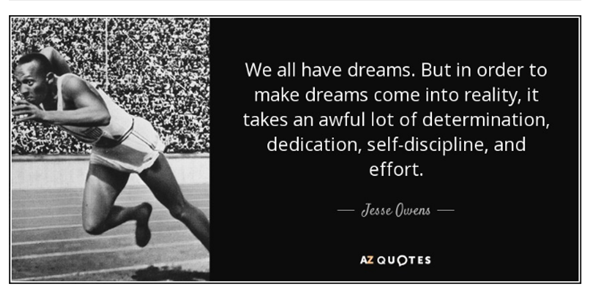Welcome to your MCI Wellbeing Blog for November!
This month we will be discussing what the 4 D’s for success are and how you can harness them in your life and studies to achieve your goals and be successful - whatever that may look like for you!
Everyone has a different idea of what success looks and feels like for them, whether it be completing an online qualification, getting that dream job, saving up for an overseas holiday, or living a quiet and peaceful life on a farm, we can all take steps to achieve these things one small step at a time. In summary the 4 D’s are:
- - Desire - the hunger for success
- - Dedication - the unwavering focus to follow your dream
- - Determination - your resolve to stay the course
- - Discipline - your ability to avoid distraction
-
The two variables in the success equation are goals + habits. While goals provide a sense of direction and help you focus, effective habits give you the mental discipline to reach your goals. If either variable is missing the success equation simply doesn’t add up. By mastering this equation, you can achieve some of the following:

-
- - Improved performance
- - Mastery of goals
- - Higher levels of satisfaction and motivation
- - Improved mental health
- - Improved self-image and self-belief
- - Greater control in life decisions
- - Awareness of strengths
- - Sharpened decision-making skills
Desire
Desire comes from desiderare, a Latin word that means "to await what the stars will bring." The Latin word siderus means "star or heavenly body." Sometimes people wish upon a star for what they most desire.
The definition of desire is a strong feeling of wanting something. It is that yearning that comes from deep inside of you. It is not that grasping external needy feeling. But that place within yourself that calls you deeper and to something greater.
A want can be defined as a simple desire for something that one does not have already. A desire is a more intense craving that a person has for something or someone. The main difference is that while a desire is stronger and an intense feeling, this is comparatively less in the case of a want.
Determination
Determination is a positive emotional feeling that involves persevering towards a difficult goal despite obstacles. Determination occurs prior to goal attainment and serves to motivate behaviour that will help achieve one's goal.
Determination is defined as a firm intent or a decision which has been reached. An example of determination is the strength to keep applying for jobs after being turned down by dozens of potential employers.
Discipline
Discipline is one of the most important personality traits in everyone's life. It refers to a set of rules and regulations which are to be followed while undergoing any task or activity. It is a way of being honest, hard-working, motivated, and encouraged while doing any task.
A student with a strong sense of discipline understands the value of wrapping up work on time and making the right moves to achieve its target. An undisciplined mind, on the other hand, lacks the focus to keep hustling and achieve a desirable goal.
Not only does practice allow one to establish a positive action. It helps us train our minds and body and enables us to focus on our goals and to regulate our emotions.
Dedication
The willingness to give a lot of time and energy to something because it is important. Dedication is important because it helps keep you going no matter how difficult the job or the task may be. As long as you are dedicated to what you are doing, you will always find a reason to keep on doing it. When you keep on finding reasons to move forward, you will eventually find success.
Dedication is an important skill because it helps nurture your work ethic and can lead to success.
The difference between dedication and discipline must be understood first. Dedication is defined as doing what you like to do and doing it well. Discipline, on the other hand, is defined as doing what you don't like to do and doing it well.
Strategies to Harness the 4 D’s in Your Life
Questions to ask yourself and reflect upon about your desires:
- What does success look like to me?
- What do I value and what is most important to me?
- What brings me happiness, meaning and/or purpose?
- What do I want to accomplish in the short term and long term?
Ways to boost your determination:
- Make bold decisions and practice using your willpower and determination to strengthen this muscle.
- Understand your emotions rather than suppressing or ignoring them.
- Face your fears and cultivate bravery in tackling challenges that may be holding you back (such as comfrot zones).
- Manage your stress and make time for self-care practices.
- Stick to your plans if you make them!
- Get plenty of sleep – whatever is an adequate amount for you and your body.
- Eat well and exercise regularly.
- Vizualise yourself as a determined person and turn that in to a reality.
Habits to practice for discipline:
According to Forbes Magazine, you can try following these nine steps to learn self-discipline and gain the willpower to live a happier, more fulfilling life -
STEP ONE: Know your strengths and weaknesses.
Self-awareness is a powerful tool for comfort zone expansion, but it requires constant focus and acknowledging your shortcomings, whatever they may be. Know your strengths, but more importantly, own up to your flaws. You can’t overcome them until you do.
STEP TWO: Remove temptations.
The fewer distractions you have, the more focused you will be on accomplishing your goals. Set yourself up for success by ditching bad influences.
STEP THREE: Set clear goals and have an execution plan.
A clear plan outlines each time-bound step you must take to reach your goals. Create a mantra to keep yourself focused. Successful people use this technique to stay on track, emotionally connect to their mission, and establish a clear finish line.
STEP FOUR: Practice daily diligence.
We aren’t born with self-discipline; it’s a learned behaviour. And just like any other skill you want to master, it requires daily practice and repetition. It must become habitual.
STEP FIVE: Create new habits and rituals.
Break your goal into small, doable steps. Instead of trying to change everything at once, focus on doing one thing consistently and master self-discipline with that goal in mind.
STEP SIX: Change your perception about willpower.
When we embrace the mindset of unlimited willpower, we continue to grow, achieve more, and develop mental toughness. Our internal conceptions about willpower and self-control can determine how disciplined we are.
STEP SEVEN: Give yourself a backup plan.
This does not mean planning for failure. Be bold and keep moving forward. Going in with a plan will help give you the mindset and self-control necessary for the situation.
STEP EIGHT: Find trusted coaches or mentors.
The development of expertise requires coaches who are capable of giving constructive, even painful, feedback. Real experts are extremely motivated students who seek out such feedback. They’re also skilled at understanding when and if a coach or mentor’s advice doesn’t work for them.
STEP NINE: Forgive yourself and move forward.
Even with all our best intentions and well laid plans, we sometimes fall short. It happens. You will have ups and downs, great successes and dismal failures. The key is to keep going.
Tips on setting goals in line with your dedication:
- Know yourself: Be honest about your ability to do something and realistic in your goal. Avoid having daily goals for things that you haven’t done before. Start small and try to work your way up to something rather than expecting perfection immediately.

- Small objectives: Take a look at what you’ve got around you and start by making smaller changes in your lifestyle. Instead of extreme elimination or extreme activity, try to slowly offer yourself options and alternatives.
- Accountability team: Try to find a trusted individual to help offer you support and hold you accountable in your journey to achieving these goals. Having an accountability partner is the best way to measure your progress and stay on track.
- Healthy expectations: You only have so much control over your goals and the outcomes due to outside circumstances. Things such as moving, birth and death, and weather can disrupt your goals. Try to be accepting and forgiving to yourself and know that any progress is good progress.
Need assistance as a student at MCI?
Do you require assistance with your studies at MCI? Do you need a role play partner? Be reminded, to please reach out to your mentor. Finally, you always have the option and are encouraged to interact with other students by joining the MCI Student Facebook page.
All the best!
.png?width=113&name=MCIinstitute_RGB_Color_Black-01%20(2).png)




